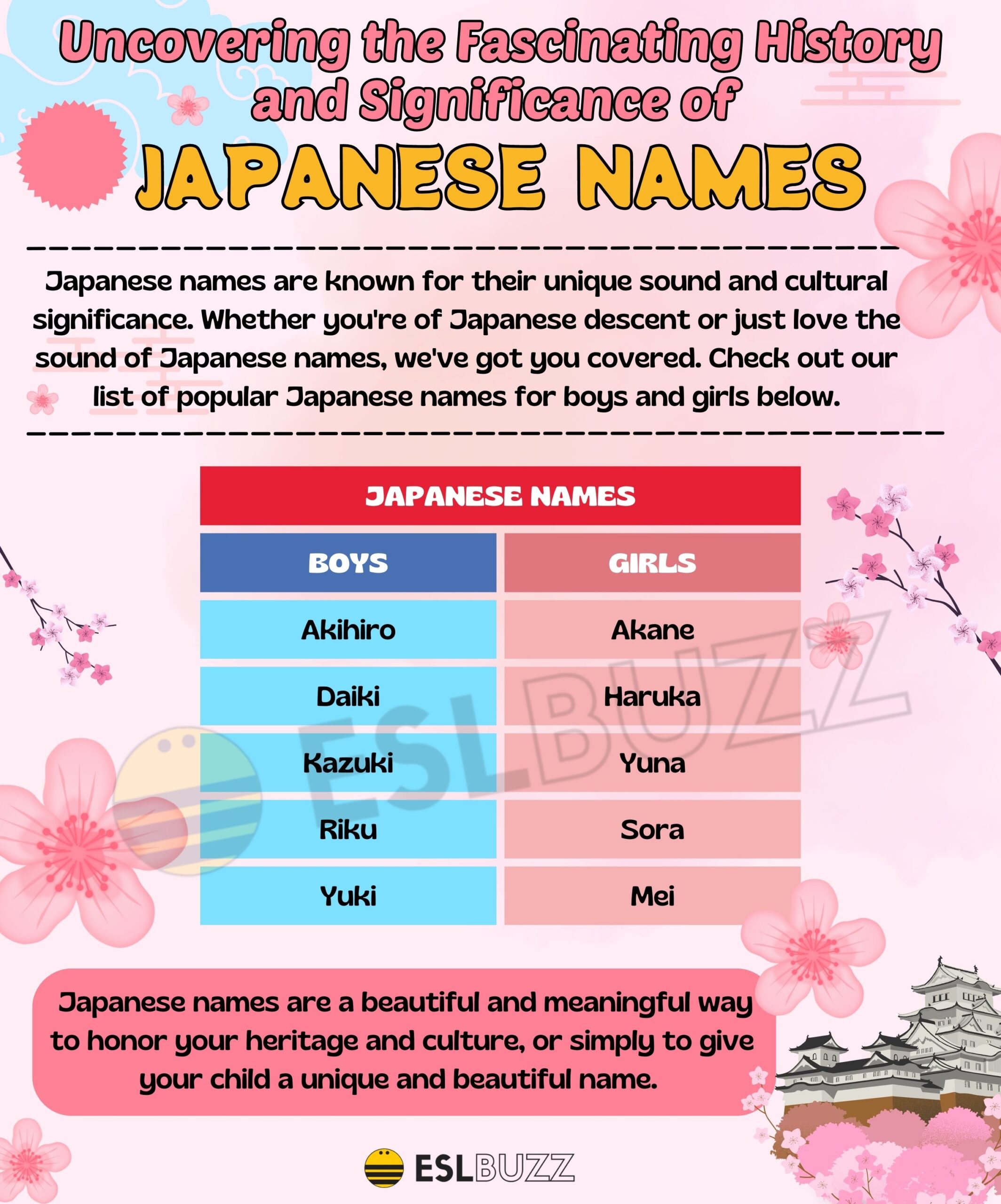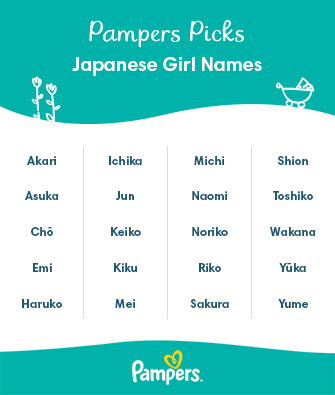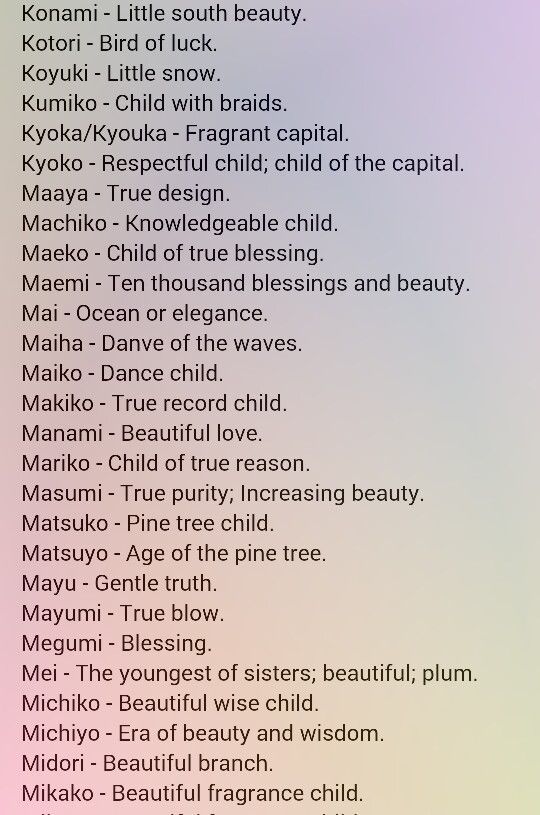Japanese names hold significant meaning and often reflect cultural and historical aspects of Japan. The meanings of Japanese names can vary based on the kanji characters used and can represent qualities like strength, beauty, nature, or virtues like loyalty and perseverance.
They often signify characteristics desired for a child or have personal meaning for the parents. Japanese names are unique and meaningful expressions of Japanese culture, reflecting the deep connection between language and identity. Their significance extends beyond mere identification, representing the hopes and aspirations of individuals and their families.

Credit: www.eslbuzz.com
Types Of Japanese Names
Japanese names have deep meanings that reflect cultural traditions and beliefs. From names based on nature like Sakura (cherry blossom) to names embodying strength like Ryu (dragon), Japanese names carry rich symbolism and significance. Discover the fascinating meanings behind different types of Japanese names in this insightful exploration.
Given Names (namae)
Japanese given names, also known as “Namae”, are personal names used to identify individuals. They hold significant meaning and often reflect the parents’ aspirations for their children. These names are carefully chosen based on various factors, including cultural, historical, and personal preferences. Some given names are rooted in nature, while others may have a symbolic or spiritual significance. Japanese given names can consist of one or multiple kanji characters, each contributing to the overall meaning. It is common for parents to seek guidance from naming books or consult with professionals to select a meaningful given name for their child.
Surnames (myoji)
Japanese surnames, known as “Myoji”, are inherited family names passed down through generations. Traditionally, these surnames were connected to specific clans or regions, and their usage was limited to certain families. However, with modernization and urbanization in Japan, the diversity of surnames has increased significantly. Many Japanese surnames have historical origins or connections to occupations and geographical locations. The order of Japanese names is typically reversed compared to Western naming conventions, with the surname preceding the given name. This reflects the importance of the family unit and emphasizes ancestral ties.
Honorific Names (yobisute)
Honorific names, also referred to as “Yobisute”, are special names used to address individuals in different social contexts. These names are typically used in formal situations or when showing respect towards others. Japanese honorific names often include suffixes, such as “-san”, “-sama”, “-chan”, or “-kun”, which convey different levels of politeness and familiarity. The use of honorific names is deeply ingrained in Japanese culture and demonstrates the importance placed on maintaining social harmony and respect for others.

Credit: www.pampers.co.uk
Significance And Symbolism
Japanese names hold deep meaning and symbolism, reflecting the rich cultural traditions of Japan. Given names in Japanese are often carefully chosen to convey certain characteristics or aspirations. They can consist of kanji characters, each with their own distinct meanings. These names may be inspired by nature, such as Sakura (cherry blossom) or Haru (spring), symbolizing beauty or new beginnings. Others may reflect virtues such as bravery (Yūki) or wisdom (Satoru). Additionally, some names are created by combining different kanji characters to form unique meanings.
| Surname | Meaning |
|---|---|
| Tanaka | Ricefield of middle |
| Sato | Village |
| Kobayashi | Small forest |
| Suzuki | Bell tree |
Japanese surnames also have symbolic meanings associated with them. For example, Tanaka means “ricefield of middle,” representing the central importance of agriculture in Japanese society. Sato signifies “village,” reflecting the close-knit communities that are a hallmark of Japanese culture. Kobayashi translates to “small forest,” evoking the profound connection between the Japanese people and nature. Meanwhile, Suzuki conveys “bell tree,” symbolizing tranquility and harmony.
By understanding the meanings and symbolism behind Japanese names, we gain insight into the culture and values of the Japanese people, as well as the significance attached to personal and family identities.

Credit: www.pinterest.com
Frequently Asked Questions For Meaning Of Japanese Names
What Do Japanese Names Mean In English?
Japanese names often have a specific meaning in English, reflecting cultural values or characteristics. For example, “Haru” means “spring” and symbolizes new beginnings, while “Akihiro” means “bright and intelligent. ” Understanding the meanings behind Japanese names can give insights into the person’s character or the values their parents wished to convey.
How Are Japanese Names Written?
Japanese names are written in kanji, which are Chinese characters that have been adapted and assigned Japanese readings. A person’s given name is usually written with one or two kanji characters, while the family name typically consists of one or more characters.
The order is reversed compared to Western naming conventions, so the family name comes before the given name when writing in traditional Japanese format.
What Are The Different Types Of Japanese Names?
There are several types of Japanese names, each with its own significance. “Kira” names are typically given to girls and carry a sense of elegance and beauty. “Satoru” names are often given to boys, symbolizing intelligence and wisdom. “Yumi” names are unisex and have a connection to a bow or arrow, representing strength and determination.
The choice of name can be influenced by cultural, historical, and personal factors.
What Is The Importance Of Kanji In Japanese Names?
Kanji characters play a significant role in Japanese names as they convey meanings and can reflect cultural, historical, or personal connections. Each kanji character has its own pronunciation and meaning, so combining different kanji characters in a name can create a unique and layered significance.
Kanji also visually enhances the name, making it visually distinct and memorable.
Conclusion
Japanese names hold deep meanings and reflect the rich cultural heritage of Japan. Understanding the significance behind these names allows us to appreciate the complexity and beauty of the Japanese language and its traditions. From its historical origins to the symbolism associated with certain characters, Japanese names offer a glimpse into the values and beliefs cherished by the Japanese people.
Exploring and embracing the meaning of Japanese names can foster a deeper connection with this captivating culture, fostering cross-cultural understanding and appreciation.







